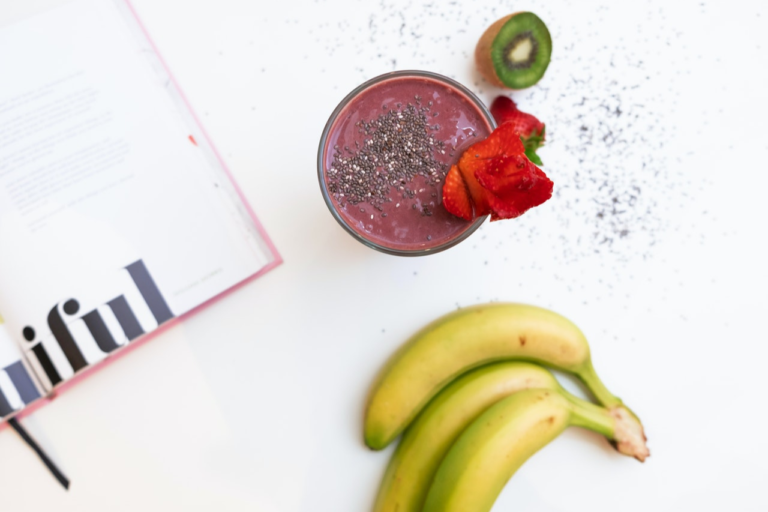Strict Diets Don’t Work, Try These 14 Small Eating Habit Changes Instead
Are you weary of the constant struggle to stick to a strict diet yet yearning for a healthier lifestyle? Thanks to the propaganda of the pervasive diet industry, many people fall into the trap of overly restrictive diets in the name of losing weight and getting healthier. Yet, a strict mindset almost always backfires when life gets messy, and we love our resolve.
There’s a better way for anyone looking for more sustainable ways to boost energy and lose weight. The uplifting news is that you can achieve your goals without solely fixating on your dietary choices.
Instead, it’s time to focus on cultivating simple yet effective eating habits that will make you feel great and stand the test of time. Let’s explore ten habits that seamlessly fit into your daily routine, helping you toward a balanced and nourishing lifestyle.
1. Eating Just the Right Amount

Eating in moderation can play a significant role in developing a healthy lifestyle. When you eat only as much as your body needs, you can consume whatever you want (within reason, of course!). Moderation is also important for your overall well-being, as it can be mentally exhausting to give up all your favorite treats.
How does one eat in moderation? Use simple tricks and habits, such as taking smaller portions of meals (and getting seconds only if you are still hungry), using smaller dishware, and keeping junk food out of sight when you aren’t eating it.
2. Paying Attention to Portion Sizes

Moderation and portion size go hand in hand. Paying attention to portion sizes is a great way to practice eating in moderation. Try these tips to avoid overeating:
- Use smaller plates – this one is actually super effective for having fewer calories!
- Splitting a dish with your family members when eating out.
- Measuring portion sizes- This way, you will know your exact calorie and nutrient intake.
- Eat in a setting where you are tuned into your senses (not while watching TV) so that you can pick up on your body’s cues of fullness.
3. Maintain Hydration Levels

Drinking adequate water throughout the day has many health benefits, including weight loss, fewer headaches, and better energy levels. Therefore, do your best to stay hydrated. Keeping a bottle of water with you wherever you go can make it easier for you to drink the recommended daily amount of water (about eight 8-ounce glasses).
Although water is not the only factor contributing to daily water intake, it’s always better to opt for plain water instead of soda or sweetened drinks. This will help with cravings, hunger, and more—a win-win!
4. Avoiding Skipping Meals

When you skip meals despite being hungry, your metabolism slows down. Thus, starving yourself will actually backfire and lead to weight gain.
Figuring out when to eat is a balance that varies for each individual. Some people have great results when it comes to delaying their first meal of the day. The key is to eat enough to feel energized during the day. In general, most people function well around a 12-hour window for eating.
For example, eating a nutritious breakfast can kickstart your metabolism and give you enough energy to keep going. It can also help you prevent overeating later in the day as you will feel less hungry to grab snacks.
5. Eating Mindfully

Anytime we become present and welcome all of our senses to eating, it is beneficial. To practice eating mindfully, do as many as you can from the following:
- Eat slowly – it’s crucial because it takes nearly 20 minutes for the brain to send the signals of being full.
- Pay attention to what you are eating (notice the smell, flavors, textures, etc.)—enjoying those meals can be a life changer!
- Understand the difference between real hunger and other triggers for eating.
- Recognize any feelings of guilt about eating.
- Recognize how food affects your mood and figure (and vice versa).
- Be grateful for the food you are eating.
6. Reading the Labels

Surprisingly, more foods than you think contain added sugar and numerous unhealthy ingredients, like added flavors, thickeners, and food dye. To spot these ingredients, you need to check the label of the products.
Avoid buying products with far too many ingredients you don’t know or can’t even pronounce. Opt for whole foods with one or a few simple ingredients that the body knows what to do with.
7. Eating More Fruits and Vegetables

Let’s admit that most of us don’t eat enough fruits and vegetables. The CDC shares that only 1 in 10 American adults get enough produce in their diet each day. It’s truly shocking!
This is why one of the best healthy nutrition habits is adding vegetables and fruits to each dish. For example, green leafy vegetables are super easy to include in your diet as a side dish! Since both fruits and vegetables are rich in vitamins, minerals, and fibers, this healthy eating habit has numerous benefits for your health. Try eating the “rainbow” to get a variety of vitamins the body needs.
8. Stick to Regular Meal Times

Try to eat at regular intervals throughout the day. This can help stabilize blood sugar levels and prevent overindulging later in the day. We all know what happens when you wait too long to eat a meal and feel starved and ready to eat everything in sight.
9. Listen to Your Body

Pay attention to your body’s hunger and fullness cues. Eat when you’re hungry and stop when you’re satisfied, rather than eating out of habit or boredom.
Many of us have developed poor eating habits from childhood (or adulthood), where we feel guilty if we don’t finish our entire meal. Ditch those old limiting beliefs and eat just enough to keep your body feeling satiated.
10. Mindset Changes

Healthy eating also involves having a positive mindset towards food and your body. Instead of viewing food as the enemy, try to see it as fuel for your body and nourishment for your overall health. This is why it’s important to avoid restrictive or crash diets.
Additionally, practice self-love and body positivity. Instead of constantly criticizing your appearance, focus on all the amazing things your body does for you and treat it with kindness and respect.
11. Avoid Emotional Eating

Many people turn to food when they’re feeling stressed, sad, or anxious. Instead of using food as a coping mechanism, find healthier alternatives like exercise, journaling, or talking to a trusted friend or therapist.
Overall, creating healthy eating habits takes time and effort. Small changes and consistency are key. Focus on nourishing your body with whole, nutrient-dense foods, staying hydrated, and listening to your body’s cues.
12. Come Prepared

When it comes to healthy eating, preparation is key. Make a grocery list before you go shopping and stick to it; avoid buying unhealthy snacks or treats that may be tempting at the moment. Meal prep for the week ahead to have healthy meals ready when you’re short on time or feeling too tired to cook.
Also, bring healthy snacks with you when going out to avoid purchasing unhealthy options. This will prevent you from feeling hungry and making impulsive food choices.
13. Ditch the Guilt

Eating and food are meant to be enjoyed! It’s a basic human need and a traditional way to socialize and connect with others. It’s important to view food as nourishment and not something to feel guilty about.
If you indulge in a treat or meal that may not be the healthiest, don’t beat yourself up for it. Enjoy it guilt-free and move on – one unhealthy meal won’t derail your overall health goals. The key is consistency and balance in your eating habits.
14. Life is a Balancing Act

To reiterate, having a healthy diet doesn’t mean that you can’t allow yourself to have a dessert or a takeout night with your friends from time to time. Rather than punishing yourself or being extra restrictive the next day or meal, focus on your long-term goals and why you want to keep working toward them.
With a few good habits set in place, your health and weight loss goals will slowly (and sustainably) come to fruition.
27 Ways People Have Successfully Lost the Weight- And Actually Kept it Off

Finding it challenging to lose those stubborn extra pounds, and growing more disheartened by the digits on your scale? The plethora of diets, exercise routines, and conflicting guidance can, without a doubt, feel quite bewildering. In the midst of numerous choices and contradictory information, you might naturally ponder: Where should you even commence?
27 Ways People Have Successfully Lost the Weight- And Actually Kept it Off
15 Delicious and Light Snacks for When You Want to Munch

We’ve all encountered that common conundrum: the search for a delightful snack that satisfies our palate without burdening us with an overload of unwanted calories
15 Delicious and Light Snacks for When You Want to Munch






